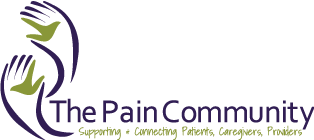What is an Advocate?
Advocates are people, paid or unpaid, who speak up for and support the wishes of themselves and/or others. Advocacy is about helping to:
- State clearly about what is wanted or needed
- Seek and obtain basic human rights
- Represent the views, impressions or position regarding a situation in order to influence others
- Listen and discuss points of view with others in a non-judgmental manner
- Gain the services and practical support that is needed and/or [are] entitled to…
Why is Pain Advocacy Necessary?
Pain, especially chronic pain, is complex, encompasses a broad variety of conditions/diseases. Almost always, quality pain care requires individualized treatment that is interdisciplinary/integrative and addresses the whole person—mind, body, and spirit, and in the context of his or her community. Regrettably, most people with pain do not receive this type of pain care.
The vast majority of people with pain are not thoroughly assessed and most are treated with single conventional modalities (such as medications, like non-steroidal anti-inflammatories (NSAIDs) and opioid analgesics, interventional procedures, or surgeries). While these treatments may provide temporary relief and some restoration of function, they also carry risks and in some circumstances may not be effective or appropriate for long-term pain management that allows people to achieve a state of “wellness.” In fact “wellness” is almost never set as a treatment goal.
It is far too common that clinicians communicate to the person with pain that:
- “There is no cure for chronic pain.”
- “ You probably will always have pain.”
- “Just take your medications or agree to this procedures or surgeries.”
- “Expect some relief that may improve your ability to function.”
- “Learn to live with pain as your new normal.”
The Pain Community does not accept this. We know—and research supports—that when people receive integrative care, they can often heal and return to wholeness. People with pain can regain function and meaning, and, sometimes, even become pain free. It is the purpose of TPC to tell these truths to people with pain, the public, policy makers, and the media. We are committed to providing you with the tools, resources, and support and coaching you need to positively change the course of your life and the pain journey you must travel.
Learn how to become an advocate for yourself or others.
The Ethical Principles of Advocacy include:
- Empowerment: gaining or regaining the power to make decisions and choices in all areas of life, large and small
- Autonomy: to be a self-determining person; to be seen as unique, and to be the individual he/she wants to be
- Citizenship: to safeguard rights; to support the person in being a fully fledged and respected citizen; and to counter injustice
- Inclusion: involving and welcoming people into groups and communities, on the basis of equality of opportunity and access
TPC leaders and members are advocates for those living with pain. TPC views advocacy in a global fashion.
- Advocacy involves representing TPC through sharing our mission and supporting and defending our organization’s message. Advocacy also means representing and defending the rights of individuals directly affected by pain.
- An advocate is an individual who can act – with awareness about quality pain care – on behalf of themselves or another person affected by pain (patient). A health care professional is also an advocate when they act on behalf of the person in their care.
TPC supports and demonstrates advocacy in various forms:
- Individual Advocacy
- Self-advocacy, which is defined as individuals speaking out for themselves. Individuals can be defined as the person with pain and/or family, a personal caregivers or health care professional speaking on the behalf of their patient with pain.
- Peer advocacy, defined as support from colleagues or cohorts. These can be seen when pain advocates who live with pain champion for one another.
- Policy (or Group) advocacy, a form of peer advocacy in which TPC alone, or in collaboration with other pain organizations, speaks up. They provide voice and support to current individuals living with pain and help develop group self-advocacy.
Take the first step and become an individual advocate: Make a personal commitment to learn how to become your best advocate. Get the quality pain care you deserve by starting to build healthy and positive relationships with your friends, family, caregivers, and health care providers. Build a network of support at home, in your local community and online with TPC.
